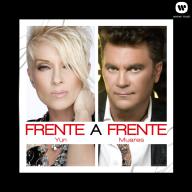Upon returning to Mexico in 1945 Aguilar pursued a career in opera, but a friend recommended he instead try his hand at mariachi and "use that powerful voice to sing the songs of the people." By 1950 he was recording, and that same year made his film debut alongside Mexican cinema legends Pedro Infante and Marga Lopez in #Un Rincón Cerca del Cielo. With 1956's #Tierra de Hombres Aguilar landed his first starring role, and in the years to follow he emerged as the biggest draw in Mexican moviemaking. Inevitably cast as a two-fisted but tender-hearted cowboy balladeer, his pictures are also credited with popularizing la charreada, a style of rodeo deeply rooted in the legendary charro tradition.
When Aguilar was not filming a motion picture, he was recording a new album. Singles including Caballo Prieto Azabache, Gabino Barrera, and Puno de Tierra made him a superstar, and in time he began writing and producing screenplays constructed around his songs. Aguilar's long marriage to actress/singer Flor Silvestre further endeared him to fans, and together they co-starred in myriad films -- she also recorded more than 100 albums in her own right. Aguilar nevertheless enjoyed his greatest popularity during the 1960s, when his stage appearances came to include elements of rodeo, complete with roping, bull-riding, and clowns -- the headliner himself even embraced the chance to show off his formidable prowess on horseback. In 1969 Aguilar returned to southern California to co-star opposite John Wayne and Rock Hudson in #The Undefeated, his first Hollywood production. The Civil War-era drama's final cut nevertheless left him deeply wounded with its stereotyped portrayal of Mexican culture, and he subsequently declined all offers from U.S. producers.
Aguilar returned home to star as Mexican heroes ranging from Pancho Villa to Emiliano Zapata. Although his popularity waned during the 1970s, by the mid-'80s he enjoyed a commercial resurgence, spearheading a revival in the tambora genre via the smash Triste Recuerdo. Three years after his triumphant Madison Square Garden stint, Aguilar earned a star on Hollywood's Walk of Fame in recognition of worldwide record sales in excess of 25 million. His health declined in the decade to follow, however, and in 2006 he mounted what proved to be a farewell tour of the U.S. After battling pneumonia, he died in Mexico City on June 19, 2007. ~ Jason Ankeny, Rovi























